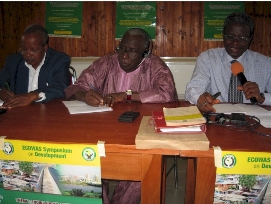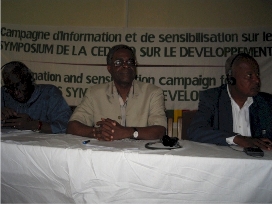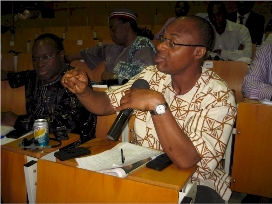Senszitization campain in Nigeria -Lagos and Ibadan
 Participants at two sensitization campaigns hosted recently by the ECOWAS Commission for academics in two Nigerian universities have admitted that there were fundamental issues militating against the development of the region. During the sensitization held at the universities of Lagos and Ibadan on 29th April 2010 and 30th April 2010 respectively, the academics noted that while most member states had celebrated 50 years of independence, they had nothing to show in terms of development, exacerbated by the lack of focus on socio-economic development.
Participants at two sensitization campaigns hosted recently by the ECOWAS Commission for academics in two Nigerian universities have admitted that there were fundamental issues militating against the development of the region. During the sensitization held at the universities of Lagos and Ibadan on 29th April 2010 and 30th April 2010 respectively, the academics noted that while most member states had celebrated 50 years of independence, they had nothing to show in terms of development, exacerbated by the lack of focus on socio-economic development.
They blamed the situation on the factors as the lack of continuity in governance, the absence of commitment by the leadership to the implementation of the development priorities churned out by the governments the demographic explosion, and urbanization and climate change, adding that these require concerted action to resolve.
They also stressed the necessity of confronting the monster of corruption including bringing perpetrators t to book in order to create the environment for appreciable regional development.
The two events were a prelude to an ECOWAS symposium scheduled to be held in Ouagadougou, Burkina Faso in June and designed by the ECOWAS Commission to sensitize stakeholders using a team of its experts who will visit cities in Nigeria and other ECOWAS member-states to educate participants on the quality of materials expected at the symposium.
The symposium on the theme: “Ending Underdevelopment: What New Prospects for West Africa? would help fashion out a new development agenda for the region after the three day event which will attract an assemblage of various stakeholders including intellectuals who will make proposals for improving the development of the region which has been ravaged by poverty and diseases.
The Chairman of the Scientific Committee of the symposium, Prof. Mustapher Kasse, challenged members of the academic community to submit papers on how the region can make progress in the area of development, stressing the imperative of intra-community unity in order to find a solution to the problem of development confronting the region.
 Kasse suggested that the papers focus on innovative ways to address the contemporary challenges of under development and cited seven areas that the ECOWAS Commission will require the input of researchers.
Kasse suggested that the papers focus on innovative ways to address the contemporary challenges of under development and cited seven areas that the ECOWAS Commission will require the input of researchers.
He sought to draw a distinction between national growth and national development, stressing that there could growth without development especially when majority of the masses leave in abject poverty.
He said that there is no limit to the areas where the academics can make their inputs include history, developmental models, the relationship between growth and development, institutions and development through small nation-states.
“It is aimed at bringing together a reference document that will represent our own collective convictions in making sure that our region does not just grow but develops.”
He said that the search for inputs was concentrated on Nigeria’s three universities — University of Lagos , University of Ibadan and the University of Abuja in recognition of Nigeria ’s prime place in the region.
In his address, Prof. Lambert Bamba, ECOWAS Commissioner, Macroeconomic Policy, said the problem of development analysis and formulation and development policies remain subjects of discussion on the African scene.
 Bamba, who was represented by Dr Nelson Magbagbeola summarized the approaches under various time frames between the 1960s and the 2000’s, highlighting further approaches as provided under models such as divide and rule hegemony which destroyed colonial period; neo-colonialism and the supporting development concepts resulting in growth without development.
Bamba, who was represented by Dr Nelson Magbagbeola summarized the approaches under various time frames between the 1960s and the 2000’s, highlighting further approaches as provided under models such as divide and rule hegemony which destroyed colonial period; neo-colonialism and the supporting development concepts resulting in growth without development.
He regretted that many countries in the region had yet designed development policies half a century after attaining independence, adding that developing countries, including Nigeria , must begin to fashion their own development models along their peculiar needs, rather than depend on those dropped by foreign organizations that are far from understanding the terrain of Africans.
He added that the objective of the symposium is to revaluate the concept of development and review its economic, social, cultural and political implications for Africa and ECOWAS member-states in particular.
In their remarks, Prof. Bola Akinterinwa from the Nigeria Institute of International Affairs, who chaired the event in Lagos and Prof. Akin Iwayemi, of the Department of Economics, U.I, who chaired in Ibadan agreed that the symposium will go beyond approaches to ensure that West Africa is move beyond economic integration.
The two acknowledged that years of conflicts have re-directed the attention of ECOWAS to conflict resolution and security matters, arguing that it is only when the region settles down to solve its economic problems that it can make the desired economic progress.

